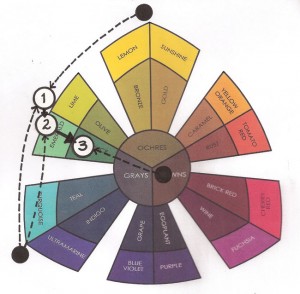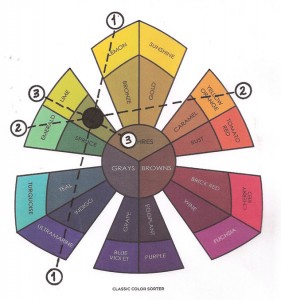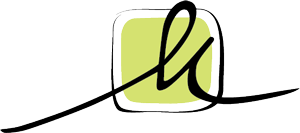Instinctive Mixing (p.60)
 When you are instinctive mixing it helps to imagine the direction that you want to move the color. Once you know the direction, you can find the path.
When you are instinctive mixing it helps to imagine the direction that you want to move the color. Once you know the direction, you can find the path.
The “path” is the imaginary line that runs between the color you have and the color that you want. If you extend this line across the color sorter, any color along that line can be used to move the color to where you want it to be. This is especially true when you are mixing the desaturated colors that fall on the inside of the color sorter. Here’s the example from the book diagrammed on the color sorter.
Color 1 shows the first step – mixing green from yellow and blue. Color 2 shows moving the color toward blue by mixing it with a little more blue. Since the color that you want has more mud in it, you need to move it toward the center of the color sorter. Color 3 shows the color moved toward the center by mixing it with “mud”, in this case a brown mud.
Imagine the other choices that fall along the same path for moving Color 2 toward the center. You could mix Color 2 with gray, with brown, with brick red, or with cherry red (the complement of emerald green) and it would move into the same place. The only difference would be in the proportion of Color 2 used in each mixture.
Weekend Extra Exercises
1. Make a small amount of emerald green and divide it into two pieces. Mix one piece with with a brown mud to make a spruce color. Mix the second piece with a cherry red to make a similar spruce color. How much mud did it take to move the emerald to spruce? How much cherry red?
 2. There can be many paths to get to the same color. Mix three versions of olive green by following three different paths:
2. There can be many paths to get to the same color. Mix three versions of olive green by following three different paths:
1. Lemon Yellow to Blue Violet
2 Emerald Green to Yellow Orange
3. Lime Green to Ochre
3. Try mixing some of the other earth colors by following different paths.
4. Cut your instinctive mixes of earth colors in half. Add white to one half. Compare the pastel versions to the original earth color. Can you see the mud?
TIPS
- Use small amounts of clay to practice instinctive mixing. Once you get the hang of moving colors along pathways you can start using larger amounts of clay with greater confidence.
- If you are not sure of proportions, start with a half and half mix and then adjust as you go.
- You don’t need to keep track of proportions in instinctive mixing but if you want to remember what you did in each step you can make small reference piles like the ones shown in the book.

